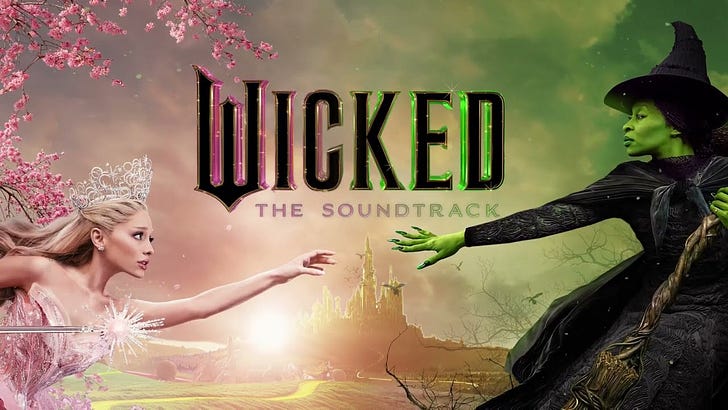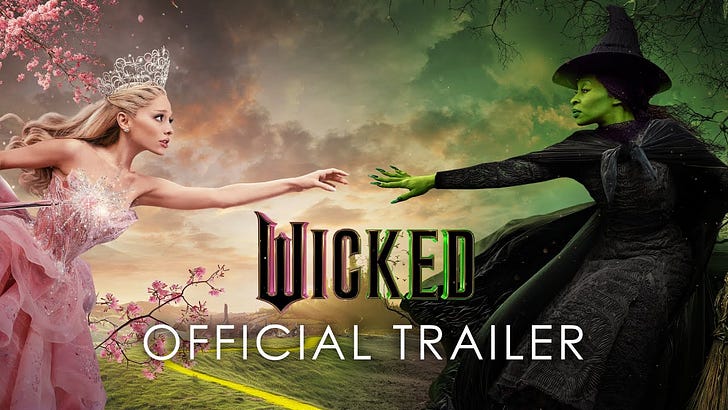Before we jump right into it, I just wanted to boost a few things I’ve done recently. Last week I serialized a novella. You can read the first two chapters here:
I also began a new project in my irregular podcast which you can listen to here:
You can also hear me talk about criticism and writing on
’s The Xanadu Review. Listen here:My wife was astounded and dismayed to discover that when I wrote about Wicked the other day I did not write about the music. So blame her for what’s to follow!
And so consider this a bit of a correction, because I do think the music is worth discussing, it being a musical and all. The songs I want to discuss are, for me, the standouts, though I’m sure musicalheads among readers will tell me which songs I should’ve picked.
We’ll start with No One Mourns the Wicked.
This song is, for me, the only real earworm in the movie. I find it echoing in my head periodically throughout the day when I’m just wandering and adrift with whatever thoughts limp through my head as the hours roll past one another. But this is also a real showcase for the flexibility and range of Ariana Grande. Just skip to 6:22 in the video about to hear just what her voice is capable of.
I remember hearing in passing how many people were not excited about Ariana Grande being cast as Glinda. I don’t follow musicals and my wife, at the time, wasn’t interested in this musical so I didn’t pay attention, but I believe people assumed she would popstar the role. I suppose this is a valid concern, or seemed like one, and then there was the controversy surrounding her relationships on set, but who am I to judge.
The flexibility and range of her voice has been on display for a long time, though, to the point where someone like me, who is not exactly her target audience1, was pretty aware of it. SNL even did a skit of it nearly ten years ago.
With that out of the way, let’s talk about the song, but specifically Ariana Grande’s performance which doesn’t begin until we’re nearly two minutes into the song.
Let us be glad
Let us be grateful
Let us rejoicify that goodness could subdue
The wicked workings of you-know-who
Isn't it nice to know?
That good will conquеr evil?
The truth we all bеlieve'll by and by
Outlive a lie
For you and—
She arrives light as a feather, her voice matching this. There’s a real airiness to her voice and we feel it both in her head and in our own, echoing like a whistling wind.
We contrast this with what sandwiches this little verse, which is the Munchkins singing in their rougher, more grounded voices. Where Glinda is poise and elegance, floating above, the Munchkins are down in it, the mud and the blood.
Glinda also calls them to consider higher ideals and concepts. Good and Evil, the everlasting war between them. Truth and Lies, the neverending battle for hearts and minds. She presents these oppositions and in doing so her audience of Munchkins believes she presents herself as the ideal of one side and Elphaba as the ideal of the other.
She is a Wicked Liar but Glinda is Good and True.
Is this who she’s speaking of, though? Given the context of what follows, of her telling the story of Elphaba—and given the actions of the novel—it seems more likely that the evil she’s speaking of is the Wizard and the truth she’s speaking of is the truth about who the Wicked Witch was. For she is not who they believe she is, not who they’ve heard.
Glinda knows. She was there.
But the Munchkins bring it back to their own lives, away from abstraction.
No one mourns the Wicked!
No one cries, “They won’t return.”
The good man scorns the Wicked
Through their lives, our children learn
what we miss when we misbehave.
A blunt kind of morality, here.
And then Glinda rises above them once more, calling them to look broader, to consider how our actions bring their own punishments.
And Goodness knows the Wicked's lives are lonely
Goodness knows the Wicked die alone
It just shows, when you're wicked
You're left only on your own
Her voice lowers to reach them, too. The Munchkins have managed to drag her down a bit from abstraction to their own lives and while she remains gliding above them, her voice is back in her chest and out of her head.
Perhaps, too, she’s giving an explanation to why Elphaba became who she became. She was lonely, lived alone, died alone, left all alone by everyone. In the context of the musical, as we discover, the Wicked moniker is thrust upon Elphaba, though this is quite different than the novel2.
And then the Munchkins follow this with their own understanding of what she’s trying to say.
Yes, Goodness knows the Wicked's lives are lonely
Goodness knows the Wicked cry alone
Nothing grows for the Wicked
They reap only what they've sown
And this contrast continues, where Glinda rises high and with compassion. And at the end of the song, where Glinda’s voice rises higher than ever before, rising miles above the Munchkins and their brute, simple hatred of Elphaba. But her voice is lost among the chorus.
This operatic combustion by Grande gives me chills. But I was raised on Wagner and opera and spent long years drowning in this kind of singing. It wraps round me and pierces through the top of my spinal column, radiating out to my extremities, burrowing deep within my chest.
And Grande captures this so perfectly. These godly notes that rise higher than angels. She’s no longer using headvoice like before but rising this high with her chest and diaphragm. When posture becomes important to your singing, you’ve reached another level.
And it is this part that echoes in my head throughout the day. I hear her voice and feel it radiating through me as she sings Goodness knows and She died alone and Good news, and, of course, that final eucatastrophic vibrato in Wicked.
But she very deliberately, throughout the whole song, entitled No One Mourns the Wicked, never sings that line.
For she knows that at least one person mourns for her.
The next song I want to talk about is Popular.
And I know someone is going to say BUT WHAT ABOUT GRAVITY and I just don’t care for it. Perhaps that’s my most murderable musical opinion, but it simply does nothing for me. I think Cynthia Erivo has a powerful and fantastic voice but none of the Elphaba songs get in my head or chest.
But so why Popular, of all possible songs? Well, I am an enormous fan of silliness and wackiness.
And I think Ariana Grande really shines here, not only vocally, but comedically. She’s very funny! This isn’t the only comedic aspect to her performance but there’s a moment in the movie from this song that makes me laugh whenever I think about it. And since I can’t show you a clip and I don’t want to describe it because that won’t be very funny, I’ll just say that the choreography, the blocking, the camera position, and Grande’s physicality make it one of the funnier visual gags I can think of from a movie made in the last few years.
Where No One Mourns the Wicked is a showcase for Grande’s vocal range, I think this one is more of an acting showcase but also a demonstration of her vocal flexibility. Because she does range widely here and bounces around rapidly between modes and styles, without ever losing track of Glinda’s voice.
From the playful growling to the puckish jauntiness to sarcastic flippancy to earnest optimism to the high rising call to action and finally to a very standard musical style to end the song.
It’s all quite fun and far ranging but all in the service of character and comedy.
Free novels:
While Grande isn’t exactly someone I listen to, I do think her song ghostin is one of the best love songs of recent years and there’s a whole lot I really love about the song.
It’s also worth noting that Elphaba is the one in the novel without magical abilities until very late into the novel. She’s also untrained and perhaps not especially good at magic. When she mages the flying monkeys, she uses science rather than magic. Glinda, on the other hand, learns magic at university and appears to be quite talented at it.







I am personally ambivalent about the score from Wicked, because I think Stephen Schwartz is very firmly a second-tier musical composer whose shtick is combining conspicuously "look-at-me-I-am-clever"-to-the-point-of-glibness lyrics with decent pop-rock orchestration, but... it mostly works here! (I do think all the good songs are clustered together in the show's first act, though.)
But something that I do like about the score - and Glinda's part in it more broadly - is that I get the impression that the glibness of some of the lyrics here is deliberate? It stands out in "Defying Gravity" when Glinda's got a few lyrics in counterpoint between Elphaba's verses - a baroque midsentence rhyme (something something something "we planned, you're" / something something "delusions of grandeur") that really stands out relative to how straightforwardly anthemic Elphaba's lyrics are. The ridiculous "absurd degree"/"verdigris" line in "The Wizard and I" is also about the most ridiculous/naive belief Elphaba has at that point of the play/film. So... IDK, maybe that's all deliberate.
Is "Pippin" on your radar? Pretty much everyone agrees it's the most successful of Schwartz's musicals, and it's doing something... kind of similar...
That second footnote is surprising, considering how the musical makes Elphaba naturally talented with magic, even if she can't control it! I've seen the musical once, but I don't remember the musical focusing in on Glinda's lack-of-talent as much as the movie did.
I was rooting for Ariana in the role of Glinda, because while her talent is hard to deny I don't think she's demonstrated this level of range as a pop singer before. She's also got comedy talents, which seems to me that she took notes while she was on Nickelodeon. I think she might be the strongest part about the overall movie!